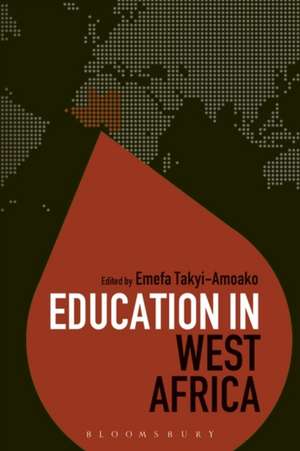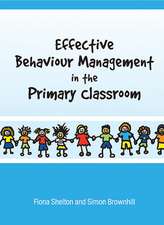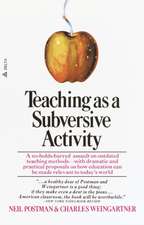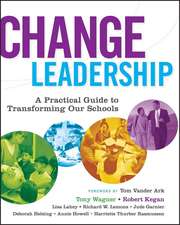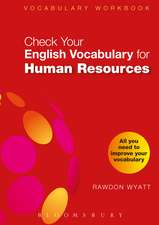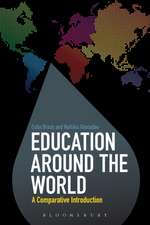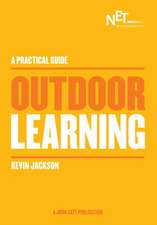Education in West Africa: Education Around the World
Editat de Dr Emefa Takyi-Amoako Dr Colin Brocken Limba Engleză Paperback – 7 sep 2016
| Toate formatele și edițiile | Preț | Express |
|---|---|---|
| Paperback (1) | 320.85 lei 3-5 săpt. | |
| Bloomsbury Publishing – 7 sep 2016 | 320.85 lei 3-5 săpt. | |
| Hardback (1) | 918.28 lei 6-8 săpt. | |
| Bloomsbury Publishing – 20 mai 2015 | 918.28 lei 6-8 săpt. |
Din seria Education Around the World
- 8%
 Preț: 313.74 lei
Preț: 313.74 lei - 8%
 Preț: 315.17 lei
Preț: 315.17 lei - 8%
 Preț: 315.17 lei
Preț: 315.17 lei - 7%
 Preț: 320.85 lei
Preț: 320.85 lei - 18%
 Preț: 315.33 lei
Preț: 315.33 lei - 18%
 Preț: 315.17 lei
Preț: 315.17 lei - 13%
 Preț: 256.12 lei
Preț: 256.12 lei - 37%
 Preț: 914.95 lei
Preț: 914.95 lei - 13%
 Preț: 316.11 lei
Preț: 316.11 lei - 8%
 Preț: 319.44 lei
Preț: 319.44 lei - 8%
 Preț: 316.11 lei
Preț: 316.11 lei - 8%
 Preț: 315.17 lei
Preț: 315.17 lei - 8%
 Preț: 316.11 lei
Preț: 316.11 lei - 37%
 Preț: 187.87 lei
Preț: 187.87 lei - 43%
 Preț: 631.21 lei
Preț: 631.21 lei - 43%
 Preț: 727.31 lei
Preț: 727.31 lei - 43%
 Preț: 631.21 lei
Preț: 631.21 lei - 44%
 Preț: 187.30 lei
Preț: 187.30 lei - 37%
 Preț: 910.69 lei
Preț: 910.69 lei - 37%
 Preț: 917.83 lei
Preț: 917.83 lei - 37%
 Preț: 912.59 lei
Preț: 912.59 lei - 37%
 Preț: 916.85 lei
Preț: 916.85 lei - 36%
 Preț: 172.36 lei
Preț: 172.36 lei - 36%
 Preț: 171.32 lei
Preț: 171.32 lei - 12%
 Preț: 234.20 lei
Preț: 234.20 lei - 8%
 Preț: 318.95 lei
Preț: 318.95 lei
Preț: 320.85 lei
Preț vechi: 346.35 lei
-7% Nou
Puncte Express: 481
Preț estimativ în valută:
61.40€ • 64.23$ • 51.00£
61.40€ • 64.23$ • 51.00£
Carte disponibilă
Livrare economică 12-26 martie
Preluare comenzi: 021 569.72.76
Specificații
ISBN-13: 9781474270618
ISBN-10: 1474270611
Pagini: 528
Dimensiuni: 156 x 234 x 28 mm
Greutate: 0.79 kg
Editura: Bloomsbury Publishing
Colecția Bloomsbury Academic
Seria Education Around the World
Locul publicării:London, United Kingdom
ISBN-10: 1474270611
Pagini: 528
Dimensiuni: 156 x 234 x 28 mm
Greutate: 0.79 kg
Editura: Bloomsbury Publishing
Colecția Bloomsbury Academic
Seria Education Around the World
Locul publicării:London, United Kingdom
Caracteristici
Authoritative handbook to education in West Africa today, written by international education experts
Notă biografică
Emefa J. Takyi-Amoako is Education, Gender and Research Consultant with a doctoral degree in Comparative and International Education from Oxford University, UK. She is Executive Director of Oxford ATP International Education, UK, and Senior Quality Expert (Higher Education).
Cuprins
Series Editor's Preface, Colin BrockNotes on ContributorsIntroduction: Education in West Africa: A Regional Overview, Emefa Takyi-Amoako (Attaining the Peak, UK)1. Benin: An Overview, Trends and Futures, Mohamed Chérif Diarra (BREDA, Senegal)2. Burkina Faso: An Overview, Martial Dembélé, Touorouzou Hervé Somé and Fernand Ouédraogo (Universite de Montreal)3. Burkina Faso: Trends and Futures, Touorizou Hervé Somé, Martial Dembélé and Fernand Ouédraogo (Universite de Montreal)4. Cameroon: An Overview, Martha Beyang Egbe (University of Ibadan, Cameroon)5. Cameroon: Trends and Futures, Willibroad Dze-Ngwa, (Savannah State University, USA)6. Cape Verde: An Overview, Trends and Futures, Jose Manuel Marques (Cape Verde)7. Chad: An Overview, Trends and Futures, Galy Panain Dibe and Mohamed Chérif Diarra, (Dakar, Senegal)8.The Gambia: An Overview, Trends and Futures, Makaireh A. Njie (ERNWACA, The Gambia)9. Ghana: An Overview, Ruby Selenu Avotri (Plan International, Ghana)10. Ghana: Trends and Futures, Daniel Justin Eshun (University of Roehampton, UK)11. Ghana: Education Financing, Ato Essuman (Methodist University College, Ghana)12. Guinea: An Overview of Higher Education, A. Tidjane Diallo, M. Kodiougou Diallo and Sékou Konate (Ministry of Higher Education, Guinea)13. Guinea-Bissau: An Overview, Trends and Futures, Akemi Yonemura (Senegal)14. Ivory Coast: An Overview, Trends and Futures, François-Joseph Azoh (ERNWACA, Ivory Coast)15. Ivory Coast: Evolving Gender Representation in Higher Education from Peace to the Era of Political Instability and Post-Conflict Reconstruction, N'Dri Thérèse Assié-Lumumba (Cornell University, USA)16. Liberia: Conflicts and Post-Conflict Trends, Barbara Reynolds (Save the Children, UK)17. Liberia: Citizenship Education in the Post-Conflict Era, Laura Quaynor (University of South Carolina, USA)18. Mali: An Overview, Trends and Futures, Mohamed Chérif Diarra (UNESCO Regional Bureau of Education in Africa, Senegal)19. Mauritania: An Overview, Trends and Futures, Akemi Yonemura (Senegal) and Mohammed Chérif Diarra (UNESCO Regional Bureau of Education in Africa, Senegal)20. Niger: An Overview, Nana-Aicha Goza (Université Abdou Moumouni de Niamey, Niger) and Ibro Chekaraou (Université Abdou Moumouni de Niamey, Niger)21. Niger: Trends and Futures, Ibro Chekaraou (Université Abdou Moumouni de Niamey, Niger) and Nana-Aicha Goza (Université Abdou Moumouni de Niamey, Niger) Ibro Chekaraou (Université Abdou Moumouni de Niamey, Niger)22. Nigeria: An Overview, Naomi A. Moland (New York University, USA)23. Nigeria: Technical, Vocational Education and Training, Benjamin Ogwo (University of Nigeria)24. Nigeria: Financing Education, Mary Ogechi Esere (University of Ilorin, Nigeria)25. Senegal: An Overview, La Salmon-Marchat and Latif Dramani (Universite de Thies, Senegal)26. Senegal: Trends and Futures, Caroline Manion (University of Montreal, Canada)27. Sierra Leone: An Overview, Kingsley Banya (Misericordia University, USA)28. Sierra Leone: Educational Trends and Futures, Kwabena Dei Ofori-Attah (Central State University, USA)29. Togo: An Overview, Philippe Amevigbe (ERNWACA, Togo)30. Togo: Trends and Futures, Kossi Souley Gbeto (University of Lomé, Togo) and Koffi Nutéfe Tsigbé (ERNWACA, Togo)Index
Recenzii
Given that too high a percentage of scholarly work on sub-Saharan Africa is produced by non-Africans, the editors of [this book] should be lauded because nearly all the authors are African ... [The book] provide[s] a useful raid on what was largely unarticulated and so help[s] to fill a gap in the scholarly literature.
Education in West Africa is essential reading for anyone concerned about providing all children with quality education. Every researcher working on West Africa will give a vote of thanks for such an invaluable resource. The wealth of essential information about the history of eighteen educational systems is complemented by insightful analyses of how colonial and postcolonial politics shaped their national agendas and their abilities to meet contemporary global development goals. The voices from these countries deserve to be heard.
This is a timely, well-crafted book that comprehensively responds to an urgent need of new ideas and perspectives in the educational terrain in West Africa. Emefa Takyi-Amoako brings together an impressive lineup of both seasoned and emerging scholars who produce a seminal work that achieves a unique regional focus in educational studies. It has the potential to become the main reference work for some time to come and should immediately serve both the research and policy analysis interests of specialized scholars, students, public sector managers and the general public.
This excellent book uses a multidisciplinary approach and multi-dimensional methodologies to assess the challenges of education in West Africa within the context of globalization. It suggests practical and valuable action-oriented strategies for investing in Africa's future generation, regardless of gender.
This collection of rigorously researched and well-presented papers on the dynamics of educational development in West Africa provides adequate lessons from hindsight (what the countries studied did or failed to do), as well as insight (the complex nature of current challenges) and foresight (future directions) for education in the sub-region. In addition to being a rich mine of information the book is more importantly a methodological guide for the study of a subject that lies at the very heart of sustainable human development. These are the characteristics that make it a resource gold mine for a variety of users - teachers and students, development-oriented researchers, development partners and policy-makers. A yawning gulf has in fact been filled in needed tools for study-research-teaching and forward-looking work on educational development in the targeted sub-region and elsewhere.
Education in West Africa is essential reading for anyone concerned about providing all children with quality education. Every researcher working on West Africa will give a vote of thanks for such an invaluable resource. The wealth of essential information about the history of eighteen educational systems is complemented by insightful analyses of how colonial and postcolonial politics shaped their national agendas and their abilities to meet contemporary global development goals. The voices from these countries deserve to be heard.
This is a timely, well-crafted book that comprehensively responds to an urgent need of new ideas and perspectives in the educational terrain in West Africa. Emefa Takyi-Amoako brings together an impressive lineup of both seasoned and emerging scholars who produce a seminal work that achieves a unique regional focus in educational studies. It has the potential to become the main reference work for some time to come and should immediately serve both the research and policy analysis interests of specialized scholars, students, public sector managers and the general public.
This excellent book uses a multidisciplinary approach and multi-dimensional methodologies to assess the challenges of education in West Africa within the context of globalization. It suggests practical and valuable action-oriented strategies for investing in Africa's future generation, regardless of gender.
This collection of rigorously researched and well-presented papers on the dynamics of educational development in West Africa provides adequate lessons from hindsight (what the countries studied did or failed to do), as well as insight (the complex nature of current challenges) and foresight (future directions) for education in the sub-region. In addition to being a rich mine of information the book is more importantly a methodological guide for the study of a subject that lies at the very heart of sustainable human development. These are the characteristics that make it a resource gold mine for a variety of users - teachers and students, development-oriented researchers, development partners and policy-makers. A yawning gulf has in fact been filled in needed tools for study-research-teaching and forward-looking work on educational development in the targeted sub-region and elsewhere.
